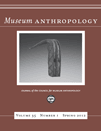
Museum Anthropology
Scope & Guideline
Unveiling the Stories Behind Cultural Collections
Introduction
Aims and Scopes
- Cultural Representation and Memory:
The journal examines how museums represent various cultures and histories, focusing on narratives that shape collective memory and identity. - Decolonization and Indigenous Knowledge:
A significant focus is on decolonizing museum practices, emphasizing the importance of Indigenous knowledge systems and the ethical implications of collecting and exhibiting cultural artifacts. - Community Engagement and Activism:
The journal highlights the role of museums in community engagement, particularly in grassroots movements and the empowerment of marginalized voices through exhibitions and programs. - Material Culture and Heritage:
Research often centers on the study of material culture, exploring how objects and artifacts convey meaning and contribute to cultural heritage. - Ethical Practices in Museum Anthropology:
The journal addresses the ethical responsibilities of museum professionals, including issues related to repatriation, representation, and the responsibilities towards communities from which artifacts originate.
Trending and Emerging
- Intersectionality and Social Justice:
Recent publications increasingly focus on intersectionality, exploring how various identities (race, gender, class) intersect within museum contexts, and advocating for social justice in representation. - Community-Centric Approaches:
There is a growing emphasis on community-centric approaches in museums, where local communities actively participate in the curation and interpretation of their cultural heritage. - Digital Innovation and Accessibility:
The integration of digital technology in museums is a trending theme, with research focusing on how digital tools can enhance accessibility and engagement with diverse audiences. - Activism and Museums:
The role of museums as spaces for activism and social change is increasingly highlighted, reflecting a broader trend towards advocacy and community involvement in museum practices. - Environmental and Climate Issues:
Emerging discussions around environmental sustainability and the role of museums in addressing climate change are becoming more prominent, reflecting broader societal concerns.
Declining or Waning
- Traditional Exhibition Practices:
There has been a noticeable reduction in discussions surrounding traditional exhibition practices, as the field increasingly embraces innovative and participatory approaches to curation. - Eurocentric Perspectives:
Papers that primarily focus on Eurocentric narratives and perspectives are becoming less frequent, indicating a shift towards more inclusive and diverse representations in museum anthropology. - Static Interpretations of Artifacts:
The emphasis on static interpretations of artifacts and their meanings is decreasing, with a growing interest in dynamic, contextual, and relational understandings of cultural objects. - Focus on Historical Collections:
Research focusing solely on historical collections without integrating contemporary issues or community perspectives is waning, as the journal seeks to address current societal challenges and responsibilities. - Conventional Anthropological Methods:
There is a decline in the use of conventional anthropological methods that do not engage with community input or collaboration, as participatory approaches gain traction.
Similar Journals

JOURNAL OF THE POLYNESIAN SOCIETY
Unveiling the Rich Tapestry of the PacificJOURNAL OF THE POLYNESIAN SOCIETY, published by Polynesian Soc Inc, is a distinguished periodical that aims to disseminate high-quality research in the fields of anthropology, archaeology, and cultural studies. With an ISSN of 0032-4000 and E-ISSN 2230-5955, this journal serves as a key resource for scholars and practitioners interested in the rich historical and cultural narratives of the Polynesian region. Since its inception, the journal has published a multitude of scholarly articles, reflecting a convergence of research from 1971 to 2022, thus establishing itself as a foundational text within its domain. The journal is indexed in notable categories with a Q4 ranking in anthropology and a Q3 in both archaeology and cultural studies as of 2023, highlighting its relevant contributions to the academic community. Moreover, its impressive Scopus ranks position it within the 80th percentile for archaeology and the 67th percentile for anthropology, showcasing its dedication to scholarly excellence. Although not an open-access publication, the journal remains a vital avenue for academic discourse and exchange, making it a significant resource for researchers, professionals, and students dedicated to understanding the diverse cultures of the Pacific Islands.

JAHRBUCH DER BERLINER MUSEEN
Advancing Knowledge in Art and HistoryJAHRBUCH DER BERLINER MUSEEN, published by GEBR MANN VERLAG, is a prestigious journal dedicated to the study and presentation of art, culture, and history as showcased in Berlin's museums. With a rich history dating back several years, this journal serves as a vital resource for researchers, professionals, and students interested in the multifaceted aspects of museum studies and cultural heritage. Although its coverage in Scopus was discontinued after 2010, it remains a significant platform for disseminating scholarly articles, exhibition reviews, and discussions surrounding museum practices and exhibitions in Germany. The journal not only contributes to academic discourse but also acts as a bridge between scholarly research and public engagement in cultural institutions. For those keen on exploring the intersection of art and scholarship within the German context, JAHRBUCH DER BERLINER MUSEEN represents an invaluable reference point.
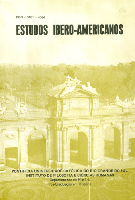
ESTUDOS IBERO-AMERICANOS
Exploring the Depths of Ibero-American HistoryESTUDOS IBERO-AMERICANOS is a premier open-access journal dedicated to the exploration and dissemination of scholarly research in the field of Hispanic and Brazilian history. Published by the esteemed Pontificia Universidade Catolica do Rio Grande Sul, this journal has been a vital platform for academic dialogue since it commenced publication in 1994 and adopted open access in 2004, ensuring its accessibility to a global audience. With an impressive Q2 ranking in the History category and a robust position within Scopus ranks (825 out of 1760), it serves as a pivotal resource for researchers, educators, and students seeking to advance their understanding of Ibero-American studies. The journal's commitment to fostering rigorous scholarship is reflected in its comprehensive scope and dedication to publishing high-quality research that contributes to the academic community's knowledge and appreciation of the diverse narratives within Ibero-American history.

AIBR-Revista de Antropologia Iberoamericana
Championing Research in Anthropology Across BordersAIBR-Revista de Antropologia Iberoamericana is a premier scholarly journal published by the ASOC ANTROPOLOGOS IBEROAMERICANOS EN RED, dedicated to advancing research and discussion in the fields of Anthropology and Cultural Studies. Since becoming an Open Access publication in 2006, this journal has facilitated the dissemination of valuable insights and innovative perspectives, making its contributions widely accessible to scholars, professionals, and students alike. Based in Madrid, Spain, it serves as a crucial platform for anthropological research emanating from the Ibero-American context. The journal is recognized within the academic community, achieving a commendable Q2 ranking in both Anthropology and Cultural Studies categories as of 2023, and ranks favorably in Scopus, highlighting its significance and impact in the field. Researchers seeking to contribute or engage with contemporary anthropological discourse will find AIBR a critical resource for knowledge production and scholarly exchange.

International Journal of the Inclusive Museum
Empowering diverse voices in museum studies.The International Journal of the Inclusive Museum, published by Common Ground Research Networks, is a leading scholarly journal that focuses on the intersections of museum studies, conservation, and inclusivity in cultural institutions. With an ISSN of 1835-2014 and E-ISSN 1835-2022, this journal has achieved an impressive Q1 ranking in both Conservation and Museology categories, reflecting its significant impact on the field since its inception in 2008. Covering a diverse range of topics related to museum practices, visitor engagement, and heritage studies, the journal provides a vital platform for researchers, professionals, and students passionate about advancing inclusive practices in museums globally. As an important resource in the academic community, it contributes to the ongoing conversation on how museums can become more accessible and relevant to diverse audiences in the contemporary landscape.
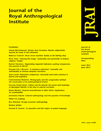
JOURNAL OF THE ROYAL ANTHROPOLOGICAL INSTITUTE
Bridging Cultures Through Scholarly ExcellenceJOURNAL OF THE ROYAL ANTHROPOLOGICAL INSTITUTE, published by Wiley, stands as a prestigious platform for scholarly discourse in the field of anthropology. With an ISSN of 1359-0987 and an E-ISSN of 1467-9655, this journal has been a vital resource for researchers, professionals, and students since its inception, featuring contributions that push the boundaries of understanding in both cultural and social anthropology. The journal’s rigorous peer-review process affirms its high academic standards, reflected in its top-tier Q1 rankings in both the Anthropology and Arts and Humanities categories for 2023. With a current ranking of #78 out of 502 in Social Sciences Anthropology and #138 out of 552 in Miscellaneous Arts and Humanities, it inhabits a critical space within academia, addressing seminal issues and innovative research. While the journal is not open access, it remains accessible to those affiliated with institutions that provide subscriptions, ensuring that groundbreaking anthropological insights are disseminated widely within the academic community. As it converges from 1995 to the present, the JOURNAL OF THE ROYAL ANTHROPOLOGICAL INSTITUTE continues to shape the landscape of anthropological research, engaging a diverse readership eager to explore the intricate tapestry of human cultures.
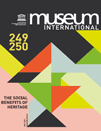
MUSEUM INTERNATIONAL
Bridging Theory and Practice in Museum StudiesMUSEUM INTERNATIONAL, a prominent journal published by Routledge Journals, Taylor & Francis Ltd, serves as an essential platform for the exploration of museology and conservation, focusing on the dynamic interplay between museums, cultural heritage, and society since its inception in 1948. With an ISSN of 1350-0775 and an E-ISSN of 1468-0033, it stands out in the academic landscape, securing a Q2 ranking in Museology and a Q3 ranking in Conservation for 2023. The journal, based in the United Kingdom, disseminates rigorous scholarship aimed at researchers, professionals, and students, fostering critical discourse on evolving practices within the field. Although it does not operate under an Open Access model, MUSEUM INTERNATIONAL remains accessible through institutional subscriptions, making invaluable resources available to those invested in the future of museums and their roles in a globalized world. This journal not only contributes to academic knowledge but also influences practical approaches in conservation and museum curation, underscoring its significance in shaping contemporary practices in cultural management.
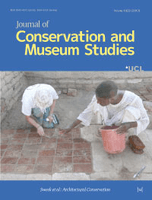
Journal of Conservation and Museum Studies
Bridging Theory and Practice in Cultural PreservationThe Journal of Conservation and Museum Studies, published by UBIQUITY PRESS LTD, is a vital resource for researchers, professionals, and students engaged in the fields of conservation and museology. With an ISSN of 2049-4572 and an E-ISSN of 1364-0429, this Open Access journal has been committed to disseminating quality research since its inception in 2011. Based in the United Kingdom, the journal features a broad range of topics within its field, serving both theoretical and practical insights for the advancing of conservation practices and museum studies. The journal is highly regarded, standing in the Q2 quartile for both Conservation and Museology categories in 2023, and achieving commendable rankings in the Scopus classification, with a percentile rank of 86th in Museology and 76th in Conservation. This demonstrates its significance as a hub for scholarly communication and innovation, fostering a deeper understanding and appreciation of cultural heritage. Join a diverse community of experts and access cutting-edge research in the field by engaging with this essential journal.
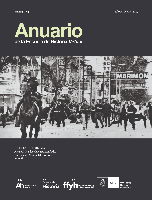
Anuario de la Escuela de Historia Virtual
Fostering Innovative Research in Historical ContextsAnuario de la Escuela de Historia Virtual is a distinguished academic journal published by the Universidad Nacional de Córdoba, Facultad de Filosofía y Humanidades. With its focus on the field of history, this peer-reviewed journal aims to foster scholarly discussion and disseminate innovative research that contributes to the understanding of historical contexts and narratives. Since transitioning to an Open Access model in 2010, it has greatly increased accessibility for researchers, professionals, and students, thereby promoting a greater exchange of knowledge across linguistic and geographical boundaries. Published under the ISSN 1853-7049, the journal provides invaluable insights into historical analysis, methodologies, and interdisciplinary approaches, ensuring its relevance in contemporary academic discourse. Its commitment to high-quality, impactful research positions it as a vital resource within the historical scholarship landscape.
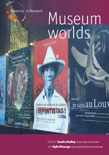
Museum Worlds
Elevating research in the evolving landscape of museums.Museum Worlds is a distinguished academic journal published by BERGHAHN JOURNALS, dedicated to advancing scholarship in the fields of Museology and Conservation. With a strong impact within the academic community, evidenced by its 2023 Scopus rankings—#16 in Museology and #32 in Conservation—this journal offers an engaging platform for innovative research and discourse surrounding museum practices and cultural heritage. Since transitioning to Open Access in 2020, Museum Worlds has broadened its reach, making valuable insights available to researchers and practitioners globally. With its publication spanning from 2019 to 2023 and positioning in the top quartiles of respective categories, this journal is integral for those invested in the evolution of museum studies, providing a space for critical reflection, debate, and the sharing of pioneering methodologies in the stewardship of cultural institutions. Located in the heart of Brooklyn, NY, it stands as a hub for the scholarly community, inviting contributions that push the boundaries of knowledge in the ever-evolving landscape of museums.